Yancey Strickler helped kickstart Kickstarter - now he's trying to help move the world away from the idea of financial maximisation towards one led by deeper values
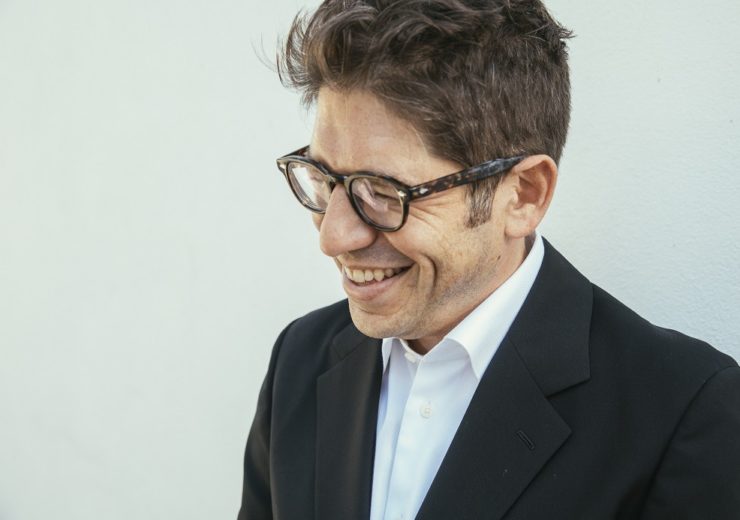
Kickstarter co-founder Yancey Strickler
As one of the people who co-founded Kickstarter, Yancey Strickler has already created a tech behemoth driving social change via crowdfunding. Since stepping down two years ago, he’s drawn up his own framework for making tough decisions that stay true to personal values rather than maximising financial gain – “bentoism”. He explains how it works to Dan Robinson.
The image on Yancey Strickler’s mobile phone background is of a grid.
Inside its four squares are words scribbled in capital letters that at first glance appear to be the rambling scrawls of a lunatic.
Under the headings of Now Me, Now Us, Future Me and Future Us are phrases like “show people the matrix”, “a better matrix”, “family, friends, deep time” and “create harmony – don’t sell out”.
These phrases are what Strickler defines as his personal values. The way they are split into four equal sections represents his “bentoism” philosophy.
It’s based on the Japanese bento box – a four-dished container filled with a variety of food.
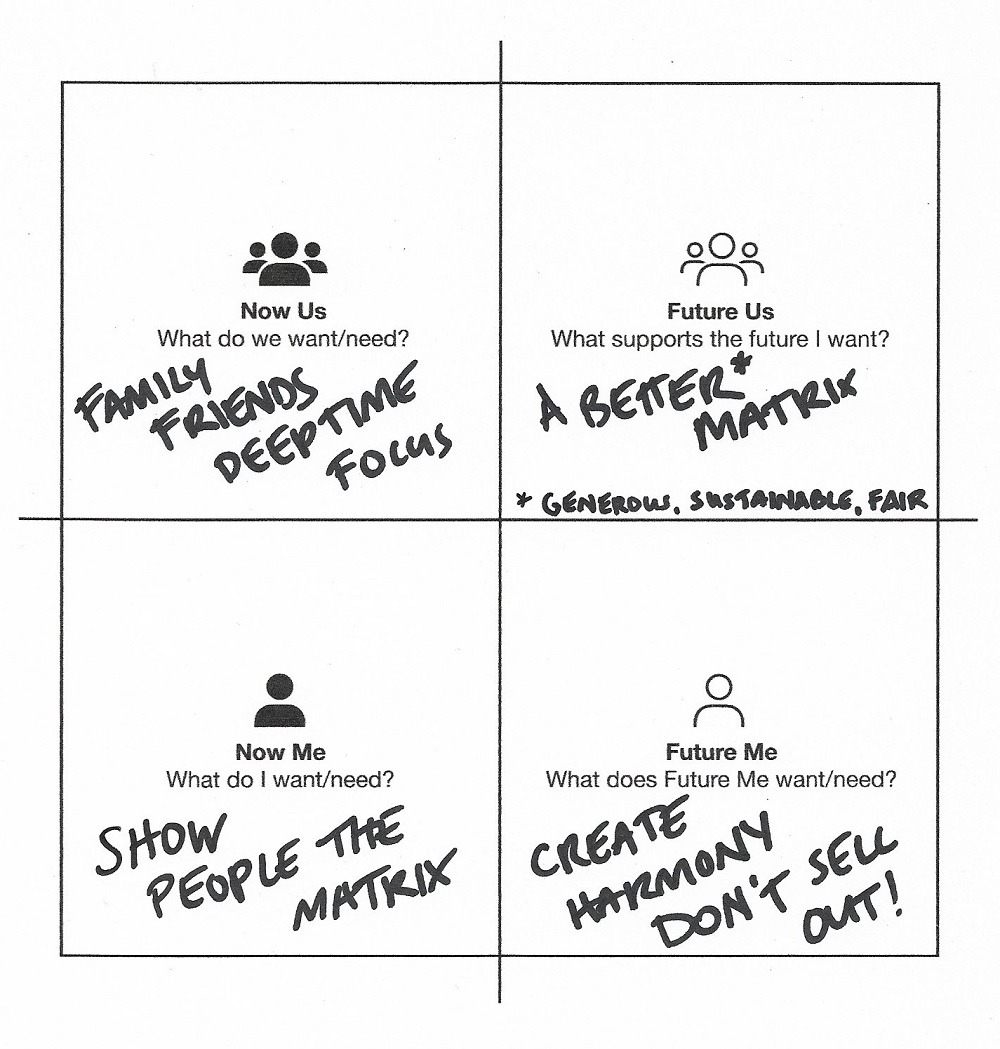
Strickler uses this analogy to help him filter difficult decisions by analysing the various outcomes, and it’s an alternative to what he calls the “financial maximisation” motivation behind many key choices made in capitalist societies today.
“Bentoism is a framework that I’ve introduced and it’s an expansion of our self-interest,” he says.
“The bento is like a healthy default that always reinforces having a variety of dishes, not overeating and having a mix of protein, vegetables et cetera.
“So bentoism is the same idea for our self-interest. It’s a way for us to see what’s going on beyond that Now Me space and really make self-coherent decisions.”
How Yancey Strickler came up with Bentoism philosophy
It should come as no great surprise that Strickler isn’t fully behind the status quo of financial maximisation that exists across the biggest economies today.
He co-founded Kickstarter alongside Perry Chen and Charles Adler in 2009 with the aim of giving a launchpad to creative ideas that may not be the most profitable, but had the potential to improve society in some way, using a crowdfunding model.
More than 17 million people have since contributed to a Kickstarter project, pledging $4.6bn and successfully funding more than 172,000 ideas.
The success has led to Strickler, who was CEO at one stage, being named one of Fortune’s “40 Under 40”, on Vanity Fair’s “New Establishment” list and a “young global leader” by the World Economic Forum.
Despite stepping down from the New York-based public-benefit corporation in October 2017, he has continued to promote alternative models to financial maximisation – “the belief that in any decision, the right choice is whichever option makes the most of money”.
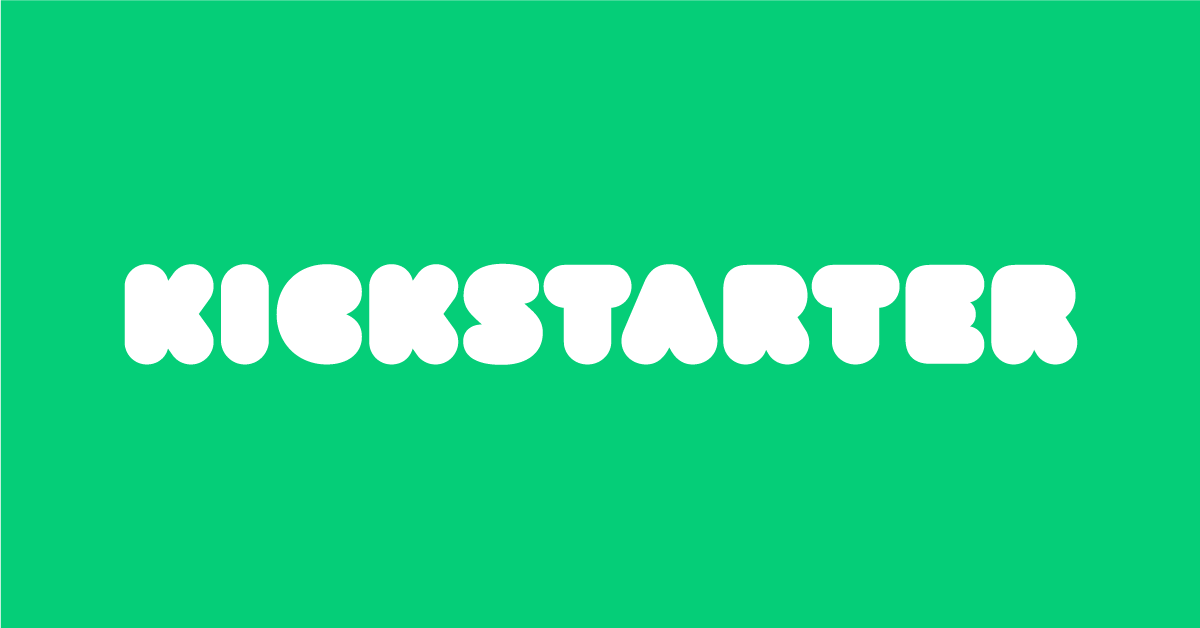
It was while studying the broader theory of self-interest that Strickler drew the “hockey stick” graph often displayed by ambitious Silicon Valley start-ups – a relatively flat period followed by hyper-growth that is illustrated by a sharp rise on the right of the chart to show when an idea is making financial returns.
“It just occurred to me that both axis on the chart – the X axis of time and the Y axis of self-interest –extended much further than we see in the hockey stick.
“I started thinking about what else is happening in those other spaces.”
He sketched out the grid that now lights up whenever he unlocks his phone and came up with the ideas behind each one.
While he has floated the concept at talks over the past few months, his new 285-page book, titled This Could be Our Future: A Manifesto for a More Generous World, is the first time this ideology has made its way into print.
In the book, he describes a dilemma for two prisoners, placed in separate interrogation rooms, who must choose whether to be loyal to each other and go to jail or inform on each other to go free.
He defines Now Me as the most self-interested voice and, in this situation, is ready to tell the authorities anything.
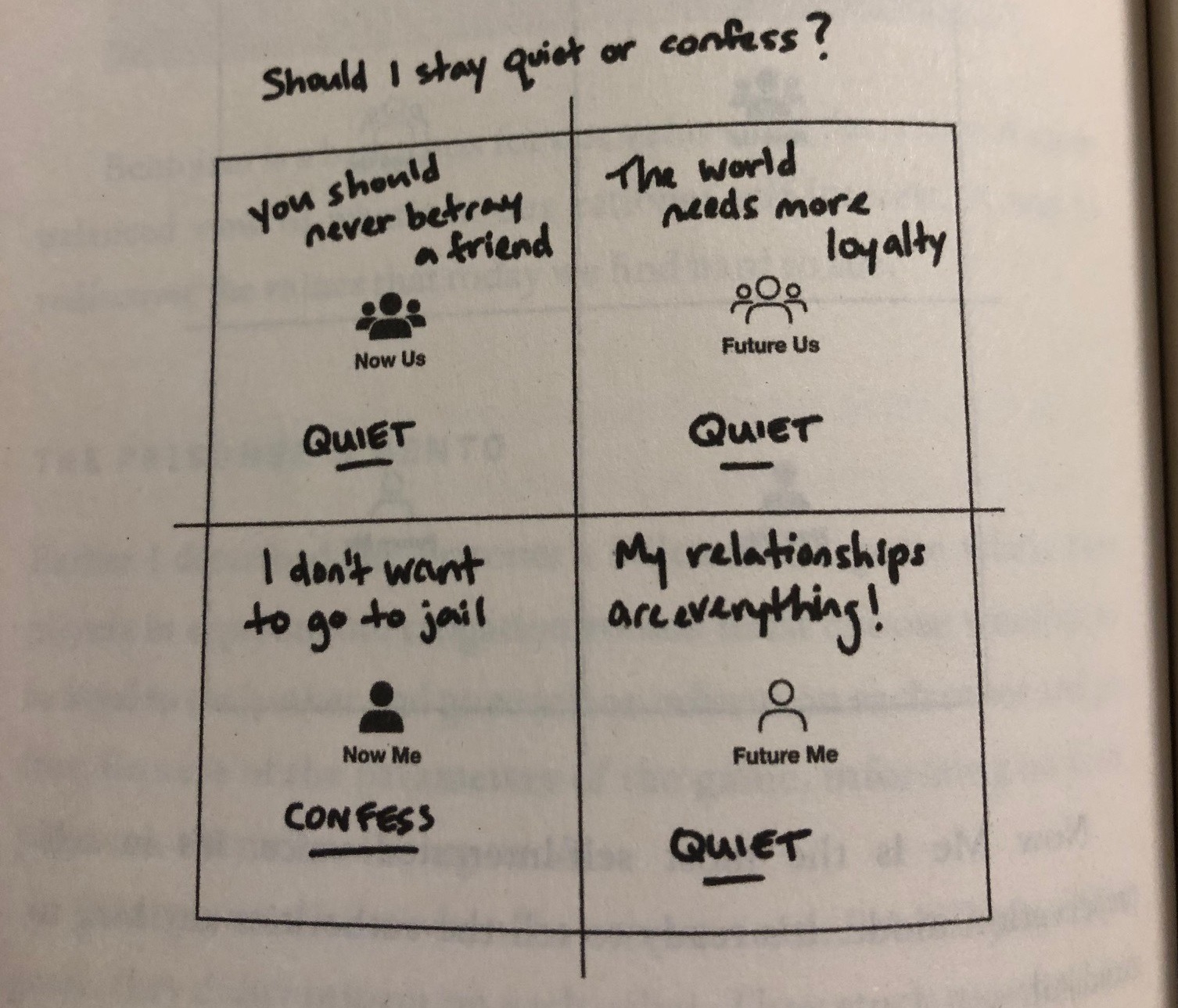
Now Us, he writes, “considers the people around us, their needs, and how our choices affect them”. Within this domain lies solidarity and a reluctance for the prisoners to send their partner to jail.
Then there’s the Future Me – the person we want to be, who doesn’t want to live to regret a decision and is reminded to stay true to personal values.
Finally, the Future Us dynamic conditions the world we want our children to live in, where people can trust each other and are loyal.
Strickler writes: “The debate is between the voices of Now Me and Now Us. But the decision is made by the values of Future Me.
“It’s a person’s values that ultimately make the call.”
Yancey Strickler on applying bentoism in business
Strickler says he’s been using this ideology for the past year as his personal decision-making tool when it comes to his views of the world being recognised – showing people his “matrix” – weighing up his responsibilities to other people, his determination not to “sell out” and a future world that is “generous, sustainable and fair”.
But he has also explored how bentoism could be a corporate tool to map out a company’s values.
He explains: “For a company, the Now Me is thinking about its employees, the company itself, the needs of the organisation – and that’s where the need for money and growth is a real thing.
“But there’s also the Future Me space for a company. What are those red lines that they must not cross?
“So for Apple, that’s about ‘think different’ and a core long-term brand promise it makes.
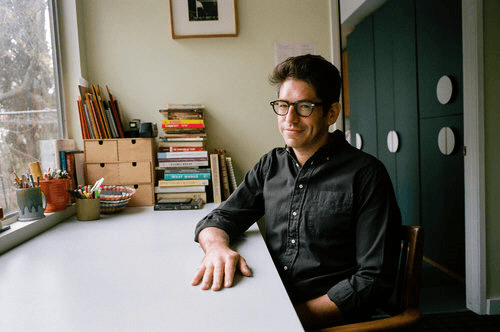
“And then a company’s Now Us is thinking about your customers, suppliers and the larger ecosystem you’re part of.
“For the Future Us, what is it that you owe them and are responsible for? What is it you’re obligated to do?
“And so when you look at all these things, they serve as a compass for how you launch a new product in a way that fulfils our Future Me expectations of ourselves and the way that meets the Now Us expectations of our customers and everyone we’re a part of.
“Also, it needs to meet our Future Me mission – the need to be sustainable and not a drag on the company.
“It’s also building us towards our vision, the Future Us of where we’re ultimately trying to go.
“So it’s meant to be something you can hold in your head – it’s not the most complicated framework in the world but it’s something that’s just meant to be a helpful guide.”
Yancey Strickler on Business Roundtable redefining the purpose of a corporation
Strickler believes values other than financial maximisation are already beginning to shine through.
In August, Business Roundtable – an association of CEOs from the largest companies in the US that employ more than 15 million people combined – redefined its understanding of the “purpose of a corporation” that moves away from simply serving shareholders.
Instead, they pledged to deliver value to customers, invest in employees, deal fairly and ethically with suppliers, support the communities in which they operate and demonstrate transparency and effective engagement with shareholders – in other words, work for all stakeholders.
JPMorgan Chase CEO Jamie Dimon, who chairs the Business Roundtable, said in a statement: “Major employers are investing in their workers and communities because they know it is the only way to be successful over the long term.
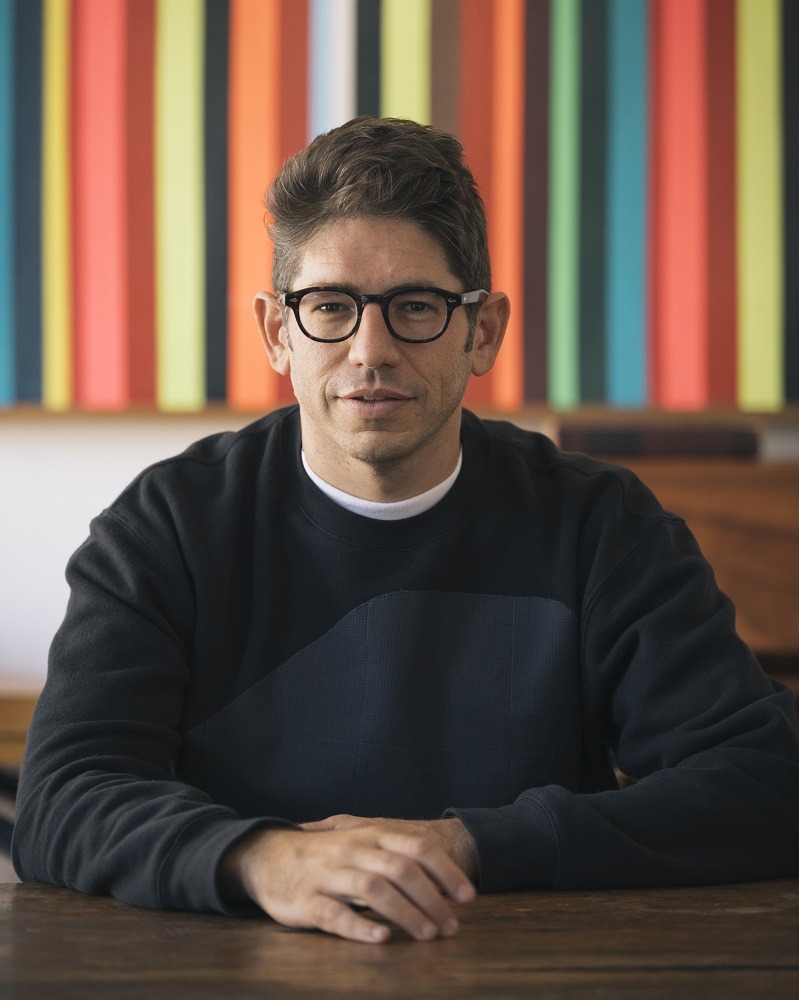
“These modernised principles reflect the business community’s unwavering commitment to continue to push for an economy that serves all Americans.”
Strickler says this marked a “significant change” in corporate America.
And while he admits he often avoids doing public speaking gigs for some companies because he doesn’t share their values, he recently allowed himself to do one that he ordinarily wouldn’t after consulting his bento philosophy.
“I ended up being shocked,” he says. “Because I found out it was a company that was trying to make exactly this kind of transition.
“It was trying to evolve from a shareholder-maximising to a stakeholder-maximising model, and it was doing this for competitive reasons because in the space it operated, none of the competitors were trying to do that.
“There was no one trying to be the good company so it saw an opportunity, but also that this was where customer expectations were increasingly heading.”
Ultimately, Strickler identifies businesses as being critical to large-scale social change due to their ability to respond to changes in their customer base and often operating in spaces where values matter.
He adds: “Businesses are critical to evolving us to where we need to go and, for the most part, are our allies.
“They want to succeed in ways that the public expects us to succeed and it’s about us setting high expectations on behalf of companies.
“And when companies try to steer towards doing something better, we should be accepting and not overly cynical of them because these are the sorts of evolutions that need to happen.
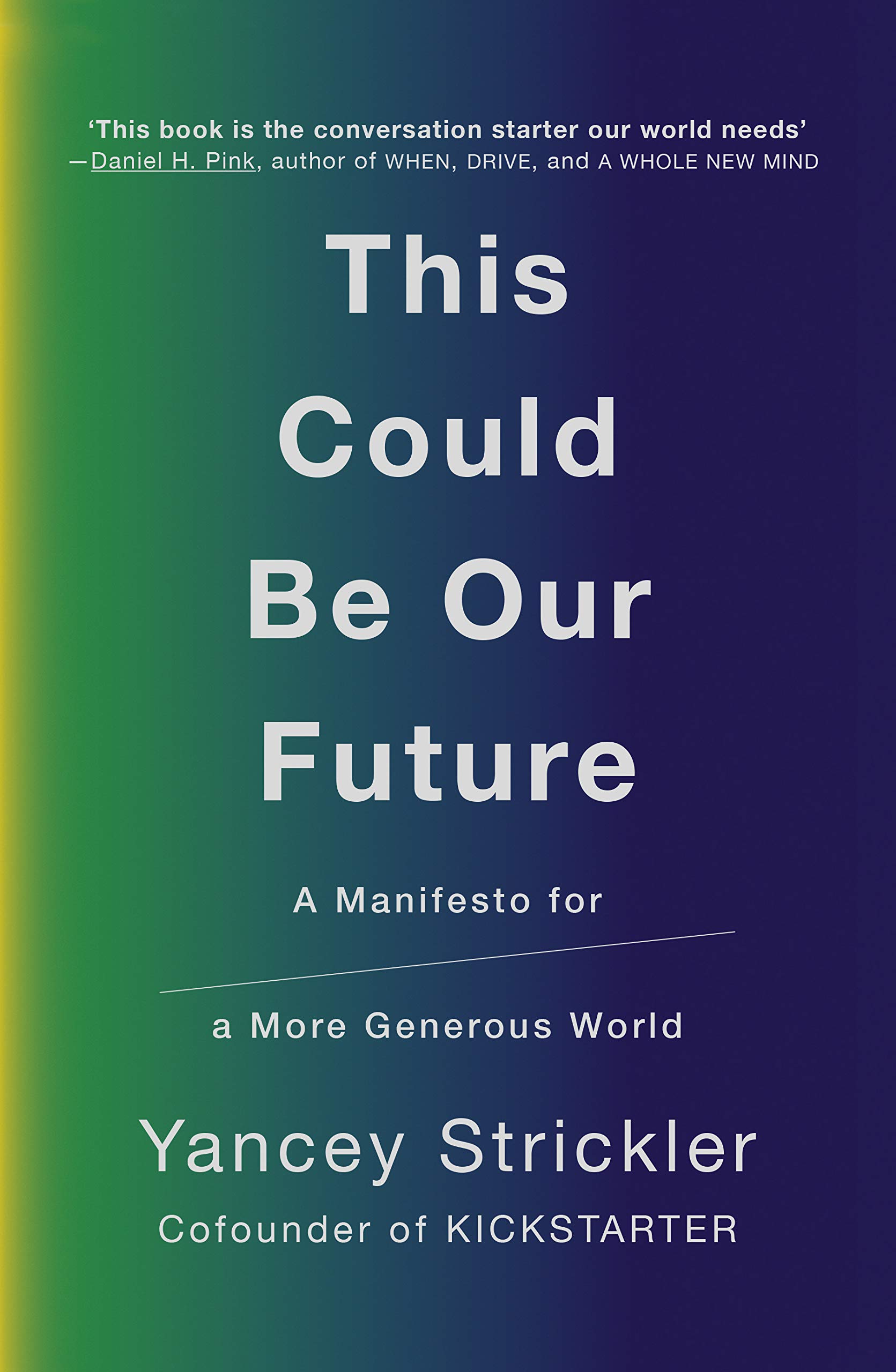
“I’m optimistic about the business community’s capacity for evolution and as nation-states get into funkier territory these days, that’s probably who we’ll have to look towards to be leading a lot of areas.”
For Strickler, he admits he’s still in a position of evolution when it comes to his own decision-making and he has realised he doesn’t have to “spoil one space to maximise another”.
“I feel like it’s missing because currently we make a lot of decisions with this blunt object of what will make the most money,” he adds.
“Certainly financial growth is important but there’s a lot of externalities to that and a lot of values we end up missing out on.”
Yancey Strickler discusses bentoism in more depth in his new book, This Could Be Our Future: A Manifesto for a More Generous World, which is released on 31 October 2019.


